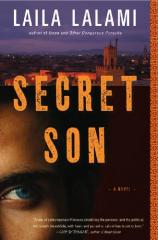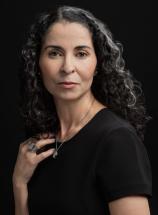Secret Son
Review
Secret Son
In the beautiful and forlorn opening scene of SECRET SON, a
violent rainstorm hits the Moroccan city of Casablanca and floods
its slums. Nineteen-year-old Youssef el-Mekki and his mother,
Rachida, are luckier than their desperate neighbors, but the leaky
tin roof of their one-room home can’t hold back the rain that
defaces Youssef’s only photograph of his dead father. As he
watches the tear-like drops ruin the picture, Youssef reflects on
how little he understands the man he can’t even remember:
“His smile was timid, or perhaps reluctant --- I had never
been able to tell.”
Youssef’s acute sense of fatherlessness is a vulnerability
his formidable mother, Rachida, a hospital clerk and orphan
herself, recognizes and has tried to offset by painting a sort of
fairy tale family history for him, in fact a multi-layered web of
lies. She tells Youssef his late father was a respectable,
hard-working school teacher and that she became a widow when
Youssef was only two. Since then she has devoted herself to the
twin goals of survival and getting her son out of the Hay An Najat
slum, where animals wander freely, raw sewage flows in the streets
and Islamic radicals bully the secular.
Youssef’s dreamy escapism is more than understandable
under the circumstances: he studies just enough to appease his
mother but mostly drifts, hanging out with dead-end friends on
street corners, playing a little soccer, smoking a little hashish
when he can afford it. He dreams of becoming an actor and taking on
Robert Redford’s role in The Great Gatsby --- or
assuming any role, any identity more compelling than his own. So
when a chance encounter with a leader of The Party, a politically
active Muslim group in the slum, plants the idea that his father
may not only be alive, but also a rich, powerful local business
owner, Youssef is hooked.
Without telling his mother, he locates his father, Nabil Amrani,
and is pleasantly surprised by the man’s response. He begins
copying his father’s Westernized ways, moves into a high-rise
apartment his father gives him, and drops out of school. But in
gaining a father, he also comes heartbreakingly close to losing a
mother. That tension and its consequences continue at an almost
unbearable pitch until the last page.
While Youssef lives in an emotional no man’s land, his own
body is also a contradiction in terms. His vivid blue eye color,
portrayed on the book’s cover, betrays that his ancestry is
much more than the typical slumdog’s: “you would expect
his eyes on Fassi, a descendant of the Moors, one of those
pedigreed men who had for generations controlled the destiny of the
nation. You might even expect them on a tribal chieftain from the
Atlas… you would not expect those eyes in the melting pot of
misery and poverty that was Hay An Najat.” Unless they were
the eyes of an overlooked illegitimate and secret son.
In her debut novel, Laila Lalami also paints a broader picture
of the highs and lows of contemporary Moroccan life, taking the
reader inside the gracious mansions of the pampered and selfish
Casablancan upper class with portrayals of a wealthy and predatory
female classmate who baldly exploits Youssef’s lack of sexual
experience and promptly dumps him, and the exclusive restaurants
and beach clubs his father frequents. When Youssef takes a job in a
luxury hotel his father owns, the degree of Morocco’s dual
personality becomes clear. Employees are culled based on their
ability to mingle with scantily clad Western guests without
staring, to serve alcohol without objection, and to wear Islamic
headscarves and beards only in parts of the hotel the guests will
never see.
Lalani’s portrait of Youssef’s half sister,
Amrani’s daughter Amal, studying in Los Angeles and somewhat
estranged from her overbearing father, shows that the flip side of
all that wealth and privilege can be a smothering sense of duty and
isolation. Youssef’s unexpected return to their
father’s life is her loss, as it makes it easier for him to
cut her off when she scandalizes him by admitting she has an
American boyfriend. At the same time, Youssef’s desperate
desire to be like his father, to please him in any way he can,
casts a harsh light on his father’s lifestyle and the
political callousness, corruption and sense of entitlement in the
people he meets. His eagerness to believe the fairy tale of his
life with his father --- a very different kind of tale than the one
his mother wanted him to learn --- makes the ultimate twist in the
story, not to be revealed here, all the more heartbreaking.
While Lalani treads gingerly on the subject of Islamic
extremism, she uses the nuanced portrait of Youssef’s wounded
sense of self to explain, without either absolution or outright
condemnation, how the injustices of a life like his can push even a
well-raised, relatively well-educated young man into the arms of
Islamic fundamentalism. Knowing that most young men in the slum
feel the deck is stacked against them, the Islamists are only too
happy to manipulate Youssef and his friends for their own ends. At
the same time, they do more for the community with free medical
clinics, disaster relief and social services than the government
ever has. And the Islamists’ cynicism and willingness to
exploit their own is the mirror image of the venality and
heartlessness of the Moroccan power elite and police force.
Quietly angry, beautifully atmospheric and achingly human, this
debut novel examines many facets of the complex society of modern
Morocco and leaves the reader feeling at once emotionally invested
and overdrawn.
Reviewed by Elliott Walker, freelance journalist, Radnor, PA on January 23, 2011
Secret Son
- Publication Date: April 21, 2009
- Genres: Fiction
- Hardcover: 291 pages
- Publisher: Algonquin Books
- ISBN-10: 1565124944
- ISBN-13: 9781565124943





